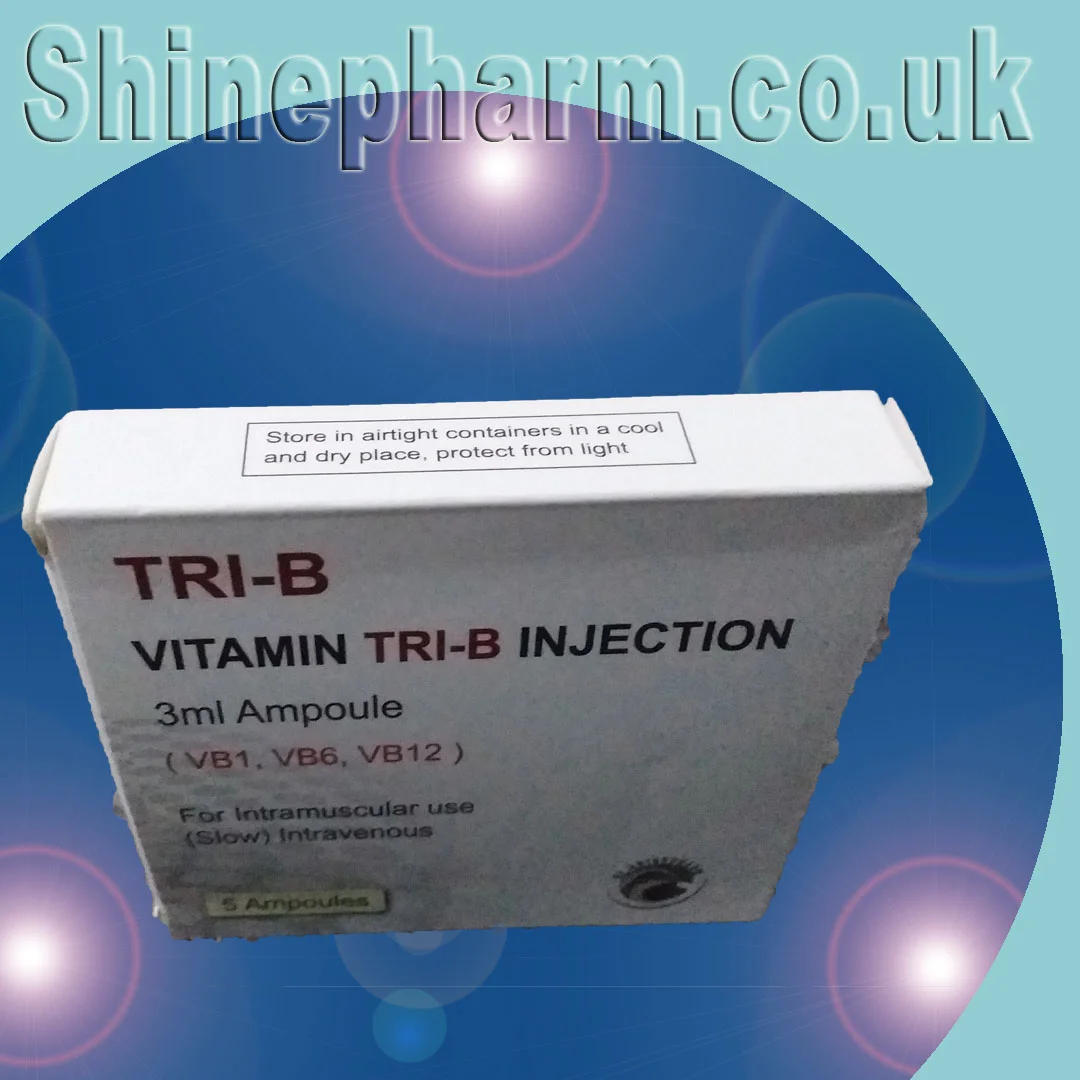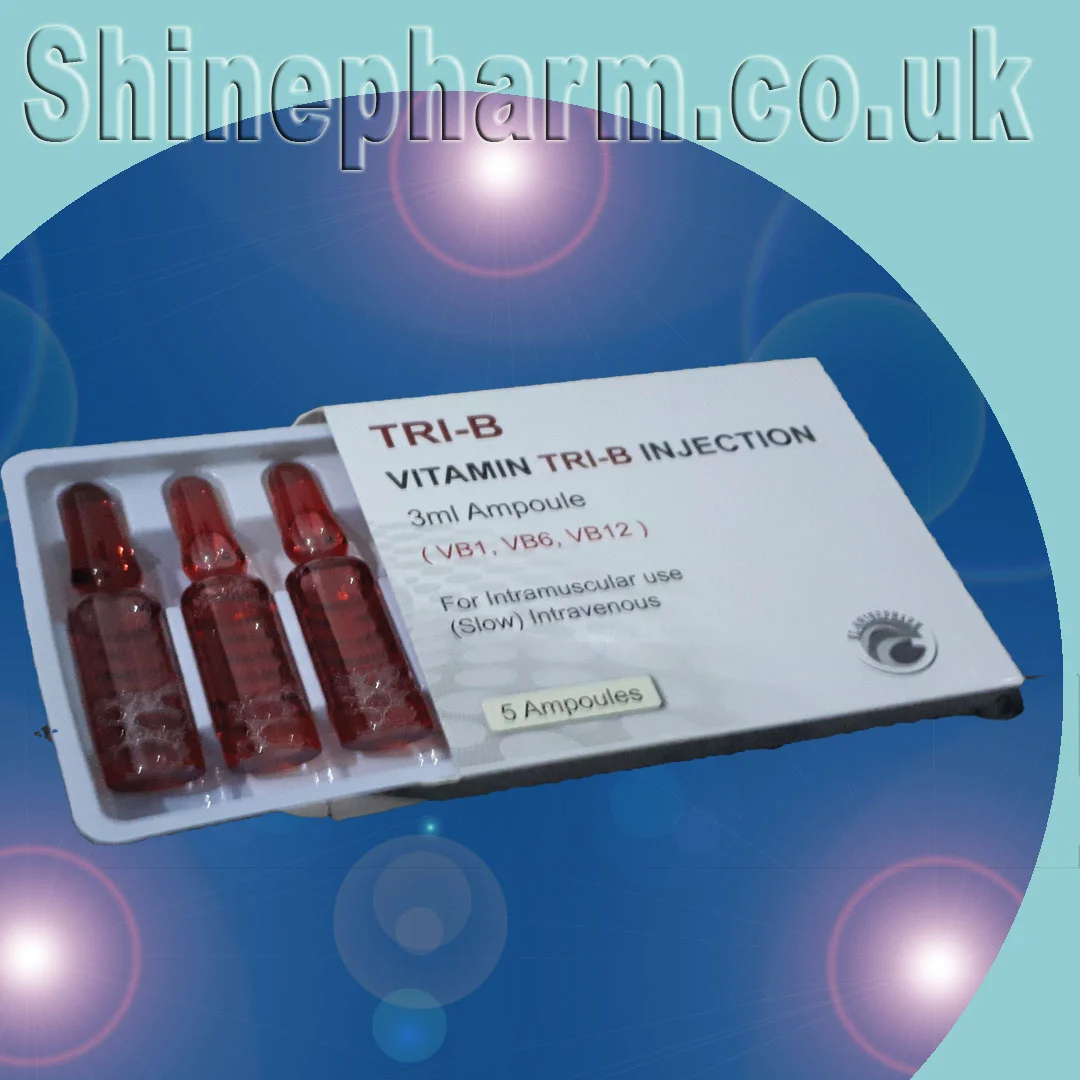Vitamin Tri B Injections




Tri B injections combine three essential vitamins - thiamine (B1), pyridoxine (B6), and cobalamin (B12) - in a single intramuscular formulation. This powerful trio works synergistically to address neurological disorders, metabolic imbalances, and chronic fatigue. The injection delivers these nutrients directly into the bloodstream, bypassing digestive absorption issues common in patients with gut disorders or post-bariatric surgery. Clinically proven to enhance nerve regeneration and cellular energy production, Tri B shots are particularly effective for diabetic neuropathy, alcohol recovery, and age-related cognitive decline. Medical supervision ensures proper dosing to avoid potential B6 toxicity or B12-induced hypokalemia.
The Tri B formula offers unique therapeutic advantages: B1 supports nerve conduction and carbohydrate metabolism, B6 regulates neurotransmitter production, and B12 maintains myelin sheath integrity. Together, they reduce neuropathic pain faster than single-vitamin therapies. Patients report improved energy within 24-48 hours, with neurological benefits emerging over 2-4 weeks. The injections are especially valuable for chemotherapy patients experiencing peripheral neuropathy, migraine sufferers, and those with fibromyalgia. Unlike oral supplements, this combination ensures complete bioavailability, making it ideal for patients with MTHFR gene mutations affecting B vitamin metabolism.
Neurologists frequently prescribe Tri B injections for Guillain-Barré syndrome, carpal tunnel syndrome, and post-herpetic neuralgia. The formulation shows particular efficacy in treating alcoholic neuropathy, with B1 preventing Wernicke's encephalopathy while B12 repairs nerve damage. Pain management specialists use it for chronic back pain and sciatica. Emerging research suggests benefits in Parkinson's disease management and multiple sclerosis symptom relief. Standard treatment protocols involve twice-weekly injections for 4-6 weeks, followed by maintenance therapy tailored to individual response and deficiency severity.
Typical Tri B injections contain 100mg B1, 50mg B6, and 1000mcg B12 per 1ml dose, administered deep intramuscularly 2-3 times weekly. For severe deficiencies, clinicians may recommend daily injections for the first week. The deltoid or ventrogluteal sites are preferred for optimal absorption. Treatment duration varies: 8-12 weeks for neuropathy, 4 weeks for energy restoration, or indefinitely for chronic conditions like pernicious anemia. Regular monitoring of B6 levels prevents toxicity, while potassium checks avoid B12-induced depletion. Adjustments are made based on serum MMA and homocysteine levels.
Tri B injections offer superior clinical outcomes compared to single B vitamin therapy for neurological conditions. The synergistic effect enhances nerve regeneration 40% faster than B12 alone in diabetic neuropathy studies. B1 potentiates B12 absorption, while B6 improves its retention. However, patients requiring high-dose B12 (e.g., for pernicious anemia) may need separate injections. The combination is more cost-effective than three individual shots but may not suit those needing customized ratios. Unlike oral B complexes, the injectable form avoids competitive absorption between vitamins in the gut.
When properly dosed, Tri B injections are generally well-tolerated. Temporary side effects may include injection site reactions (8% of patients) or mild diarrhea (3%). Rare but serious risks include B6-induced sensory neuropathy at doses exceeding 200mg daily long-term. Contraindications include hypersensitivity to any component and concurrent levodopa therapy (B6 interferes). Caution is needed in patients with renal impairment or history of seizures. Proper injection technique minimizes tissue irritation from the acidic B1 component. Patients should report persistent headaches or unusual tingling immediately.
Tri B injections work through complementary mechanisms: B1 (thiamine) acts as a coenzyme in energy metabolism, B6 (pyridoxine) facilitates neurotransmitter synthesis (GABA, serotonin), and B12 (cobalamin) supports myelin formation and nerve conduction. Research shows the combination upregulates nerve growth factor (NGF) 2-3 times more effectively than single vitamins. The injectable form achieves 90% serum bioavailability within 2 hours versus 7% average absorption from oral supplements in patients with gut disorders. PET scans demonstrate improved cerebral glucose utilization within 72 hours post-injection, explaining the rapid cognitive benefits reported by patients.
Ideal candidates include patients with: confirmed B vitamin deficiencies, type 2 diabetes with neuropathy, chronic alcohol use disorder, or post-infectious fatigue syndromes. Those with gastric bypass history, long-term PPI use, or vegan diets often benefit significantly. Neurological symptoms like persistent tingling, balance issues, or "brain fog" warrant evaluation. Screening includes serum B12, RBC thiamine, and PLP (B6) tests, plus homocysteine and MMA levels. Treatment isn't recommended for general wellness without documented deficiency or specific neurological indications due to potential nutrient imbalances.
Most patients experience a staged response: improved energy and sleep within 1 week, reduced neuropathic pain by week 3-4, and enhanced cognitive function after 6-8 weeks. Intensive phase (2-3 weekly injections) typically lasts 4 weeks, followed by weekly maintenance for 2 months. Chronic conditions may require monthly lifelong therapy. Objective measures include nerve conduction studies and quality-of-life questionnaires. About 15% of patients are non-responders, often due to concurrent nutrient deficiencies (like magnesium or folate) that require additional supplementation for full therapeutic effect.
Tri B injections cost $35-$75 per session depending on clinic and geographic location. Many insurance plans cover treatment for FDA-approved indications (e.g., documented B12 deficiency with neurological manifestations) with prior authorization. Medicare Part B covers B12 injections but may not reimburse for the combination formula. Out-of-pocket costs apply for off-label uses like fibromyalgia. Some functional medicine clinics offer package deals (e.g., 6 sessions for $300). While more expensive than oral B vitamins, the clinical outcomes often justify the cost for appropriate candidates.
For chronic conditions, maintenance therapy typically involves monthly injections after initial intensive treatment. Regular monitoring includes: annual B12 levels, semi-annual kidney function tests (for B6 clearance), and periodic neurological assessments. Some patients eventually transition to sublingual B12 with occasional booster injections. Dietary modifications enhance treatment efficacy - emphasizing B-rich foods like nutritional yeast, wild salmon, and pasture-raised eggs. Patients are educated to recognize early signs of re-emerging deficiency (increased fatigue, tingling) to prompt timely retreatment.
Current studies investigate Tri B injections for: COVID-related anosmia recovery, chemotherapy-induced cognitive impairment ("chemo brain"), and traumatic nerve injury rehabilitation. New extended-release formulations (lasting 2-4 weeks per injection) are in Phase III trials. Genetic research is identifying polymorphisms that predict superior response to the combination therapy. Some clinics now offer customized ratios (e.g., higher B12 for neurological cases, extra B1 for metabolic disorders). These advances promise to personalize treatment while reducing injection frequency for improved patient compliance.
This neurotropic combination (Thiamine B1 + Pyridoxine B6 + Cyanocobalamin B12) is used for: peripheral neuropathy (diabetic/alcoholic), nerve compression syndromes, vitamin deficiency states, and chronic pain management. Also prescribed for neuritis, neuralgia, and post-surgical nerve repair.
• Deep IM injection in gluteal/deltoid muscle
• Typical regimen: 2ml every other day or 3x/week
• Acute cases: Daily for 5-7 days then reduce frequency
• Maintenance: Weekly/monthly depending on condition
• Rotate injection sites to prevent tissue irritation
The synergy enhances: nerve regeneration (B12), pain modulation (B6), and carbohydrate metabolism (B1). Together they improve myelin sheath formation more effectively than single vitamins, especially for neuropathic conditions.
Standard 2ml ampoule contains:
• Thiamine HCl (B1): 100mg
• Pyridoxine HCl (B6): 100mg
• Cyanocobalamin (B12): 1000mcg
May include lidocaine 1% for painless injection in some formulations.
Only with proper training - improper technique risks nerve damage or sterile abscess. Most formulations require healthcare professional administration. Exception: Some prefilled pens allow home use under medical supervision.
1. Contraindicated in Leber's disease (B12 risk)
2. Caution with Parkinson's meds (B6 interference)
3. Monitor for allergic reactions (thiamine risk)
4. May mask folate/B12 deficiency symptoms
5. Risk of peripheral neuropathy with prolonged high-dose B6
• Pain reduction: Within 3-5 doses
• Improved sensation: 2-4 weeks
• Nerve conduction: 6-8 weeks for measurable changes
• Maximum benefit: After 3 months of regular therapy
Effects are cumulative and dose-dependent.
• Levodopa: B6 reduces efficacy
• Phenytoin: B12 decreases absorption
• Chemotherapy: Thiamine may interfere
• Metformin: Reduces B12 levels
• Proton pump inhibitors: Impair B12 absorption
• Apply pressure for 30 seconds post-injection
• Warm compress if nodule forms
• Monitor for persistent pain/swelling
• Document rotation sites systematically
• Report any skin changes immediately
Doses >200mg/day for >1 month may cause sensory neuropathy. The 100mg in Tri B injections is therapeutic yet safe for most patients when given 2-3x weekly.